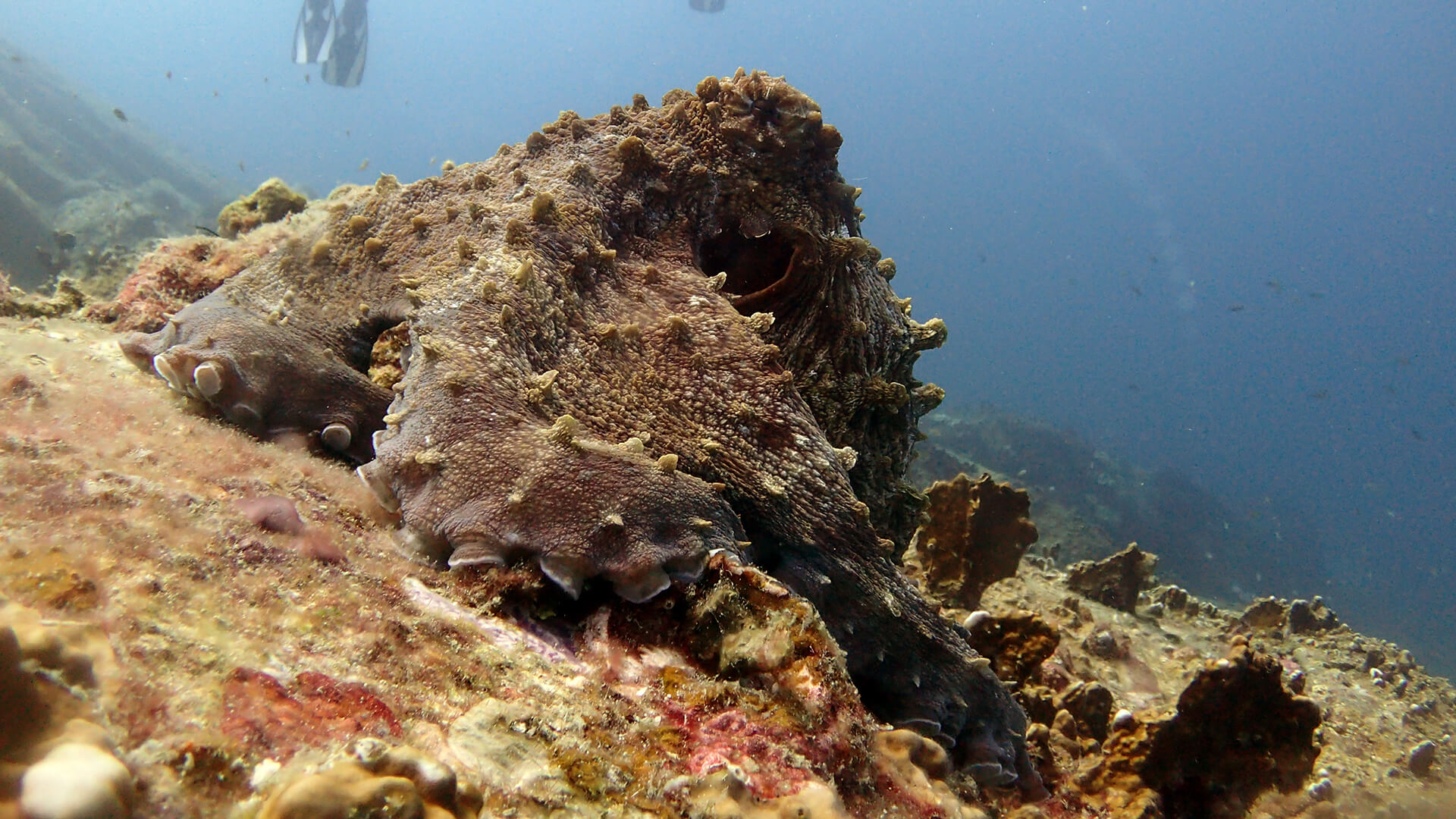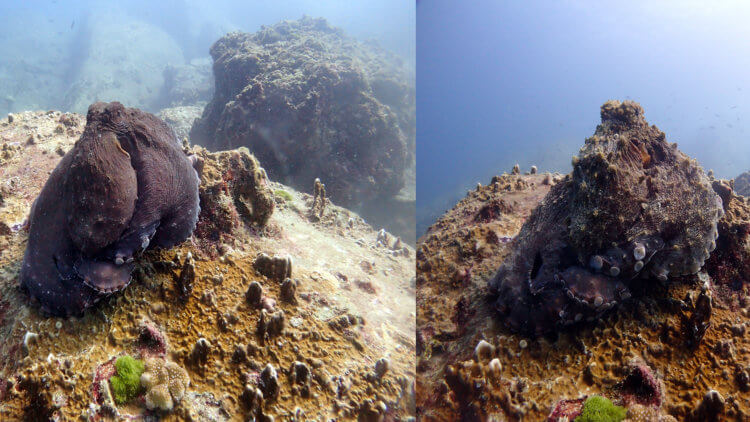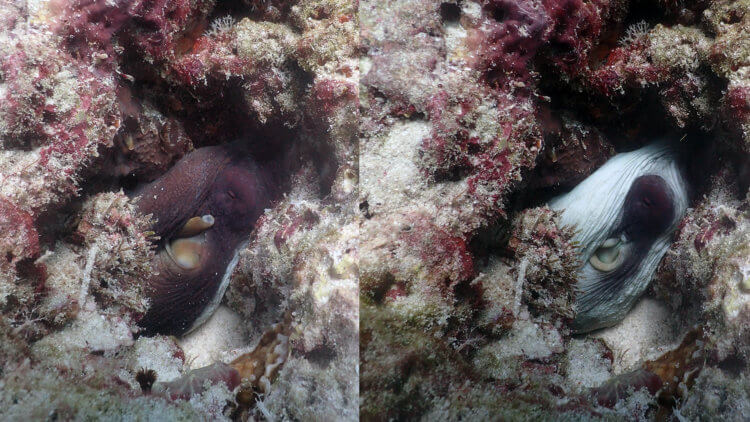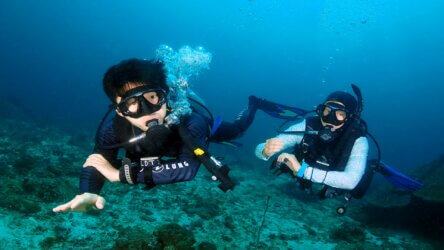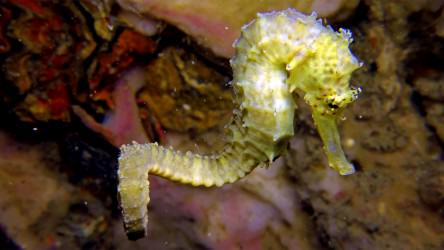Octopus Are The Undisputed Masters Of Mimicry But How Do They Do It?
Dazzling colour changes and perfect camouflage make octopus a favourite with everybody diving in Phuket but how do they perform this magic trick, well it’s not mirrors, sorcery or witchcraft it’s a complex combination of muscle, nerves, brain and skin pigments. By far the most common octopus we see when diving in Phuket is the day octopus (octopus cyanea) so we’ll base our facts around this very convenient creature (we don’t do night dives).
Chromataphores
That’s what the cells are called, octopus have thousands of different colour chromataphores to every square inch of skin. Think of them as tiny balloons filled with coloured ink. The ‘ink balloons’ on most octopus come in black, brown, red, orange and yellow. The octopus sends a signal from the brain via the nerves to the muscle surrounding the balloons. The muscles contract the base of the balloon which enlarges the surface area and pushes the pigment to the top – simple!
As you can see from the video. The colour changes aren’t restricted to just one blanket change but any area of the body can be changed to any available colour to suit its needs. It makes the chameleon, an animal renowned for its colour changing ability look… well, rubbish.
Colourblind!
Yep, that’s right an animal that can instantaneously change the colour of its skin to perfectly match its environment, dazzle predators or signal to other octopuses is completely colourblind. Which makes the ability all the more incredible. Scientists think that their skin is possibly light sensitive. Suggesting that they can somehow see with their skin.
Game Of Shadows
Not only can they use camouflage to hide from predators but they can produce a cloud of ink to hide an escape. Again as with all things octopus it can do more than just randomly shoot out the ink. They can add mucus to the ink which forms individual shadows in the water that almost exactly matches the animals body mass. Predators have been seen to attack these clouds while the octopus slips away.
Intelligent?
It’s suggested they have the relative intelligence of a domestic cat – nothing to boast about about in my opinion, our office cat is fairly dense. We’ve all heard about octopus predicting world cup results, escaping from the impossible and learning how to unscrew jars but gauging an animals intelligence to how our brain works is extremely difficult.
Asking an octopus to solve a simple maths question would probably result in a blank weary stare as an answer but maybe think about reversing the roles. If an octopus asked us to do something that’s straight forward to them such as changing the colour of your skin to red and white stripes, producing a cloud of toxins from your anus (oh oh, can do!) or throwing away your left arm all but the most determined/disturbed of us would come up short – now who’s the idiot…
Live Fast, Die Young!
Most animals with any level of intelligence live for at least a couple of years and in most cases a lot longer. Sadly it’s not the case for our day octopus. They have a lifespan of only 12 to 15 months. They grow very fast and when young can increase their body weight by 5% a day!
When mating the octopus around Phuket are far less timid than usual. Their visual signals to each other are mesmerising to watch but unfortunately it’s a bitter sweet moment. The display signals the final phase of both sexes lives. The female will find a hole to lay and guard her eggs and will die as soon as they’ve hatched. The male will still carry on for a little while killing females softly with his love but will soon go belly up.
High Protein Diet
Octopus are veracious predators and need plenty of food to fuel their incredibly fast growth rates. Crabs and other crustaceans are quickly enveloped in a seemingly unfair number of arms then bitten with the parrot like beak which is also covered in a toxic saliva (all cephalopods are believed to be venomous to a certain degree). They also have a radula (freaky rasping tongue) that can drill through shell fish then inject toxins to make it release its body from the shell.
Finding Octopus
The easiest solution is to rely on our keen eyed guides and instructors. However there are a couple of tell tale signs to look out for. If you see a hole in the reef surrounded by freshly moved rubble and some random crab and snail shells then it’s probably an octopus lair. Small groupers will follow octopus when they’re hunting. So if you see an unusually large congregation all staring at the same place then there could be an octopus nearby.
Find Your octopus With Local Dive Thailand
Posted in Rare & Peculiar Critters on .
